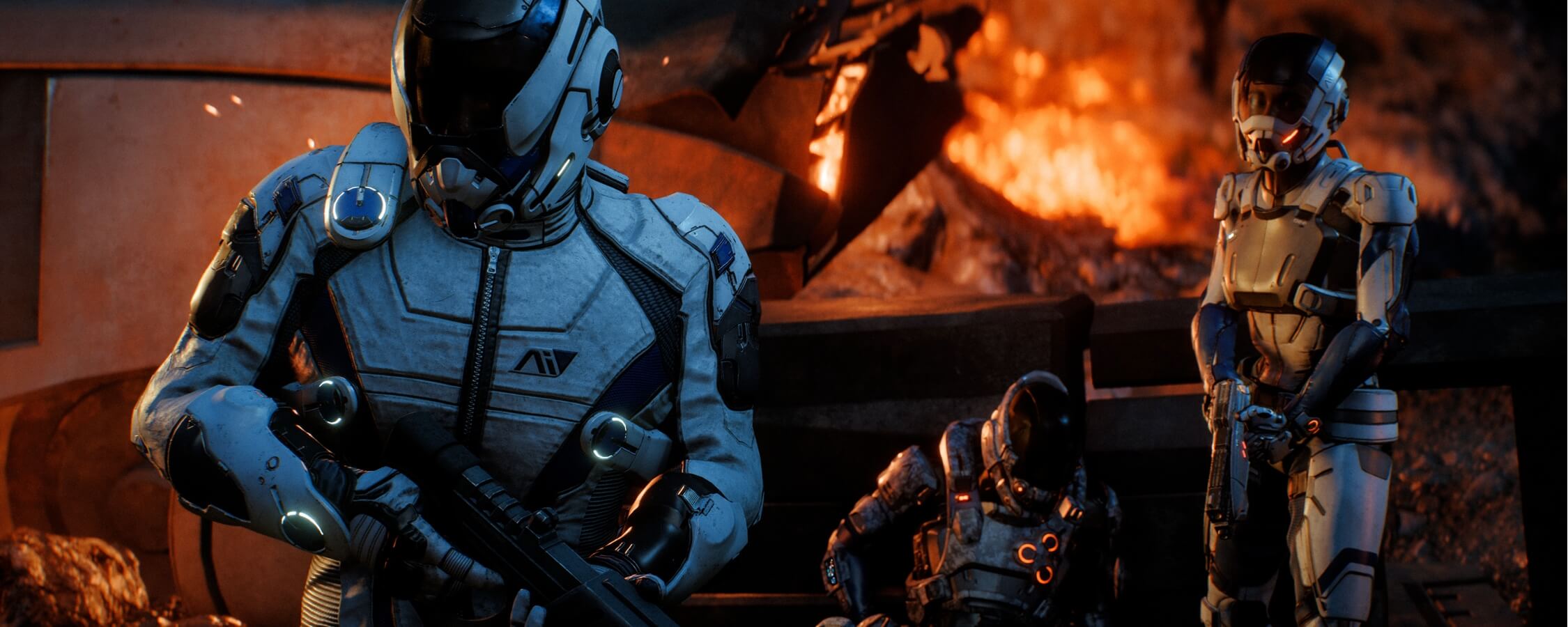It's hard to believe five years have passed since the March 2012 release of Mass Effect 3, which cemented the trilogy as something of a modern cult classic among RPG fans. Given the prestige associated with the series, it should come as no surprise that it received a new title and even less of a surprise that it's been on our list of must-play PC games for 2017.
Developed by BioWare and published by EA on PC, Xbox One and PS4, Mass Effect: Andromeda vows to be bigger and more beautiful than prior releases. Although initial impressions indicate that the game delivers on some of those promises, it hasn't been a flawless execution so you may want to read a full review before buying this one (or just Google "Andromeda animations").

The game begins in the Milky Way Galaxy during the 22nd century with humanity planning to populate new home worlds in the Andromeda Galaxy as part of a strategy called the "Andromeda Initiative." The player assumes the role of either Scott or Sara Ryder, an inexperienced military recruit who joins the Initiative and wakes up in Andromeda following a 600-year journey.
Mass Effect: Andromeda features some open world elements and emphasizes exploration. Many of the series' traditional gameplay elements will remain, while others have been modified, such as combat, which is less cover-based and more mobile.
Previous Mass Effect games were built upon the Unreal Engine but Andromeda uses Frostbite 3. This move meant that BioWare had to build all its systems, tools, and assets from scratch. Ironically, a big part of the switch was to help enhance character animation, so I hope they had more success in other areas.
Although Frostbite 3 does support DirectX 12, the developer has opted to stick with DX11, at least for now anyway. That's not shocking though. While Mass Effect games have always looked great, the series has never really pushed game engines to their limits. The previous three installments all used DirectX 9 for example, even 2012's Mass Effect 3 stuck with DX9 despite wide use of DX10 at the time as well as the availability of DX11.

On PC, the developer recommends playing Mass Effect: Andromeda with either an Intel Core i7-4790 or AMD FX 8350, which is an odd contrast. Surely a lower-end Core i5 processor will suffice if they are recommending the FX-8350 and clearly these recommendations were made before Ryzen landed.
On the graphics side, it's suggested that gamers arm themselves with at least a GeForce GTX 1060 3GB or GTX 970 – apparently you're out of luck if you own a Radeon graphics card (kidding of course, something like the RX 470 should suffice since the GTX 1060 3GB is recommended).
By failing to mention a single AMD graphics card, it's clear this is an Nvidia sponsored title, so you can expect the green team to have the upper-hand out of the gate. That said, AMD seems to be very much on top of the driver game right now and has already released an update.
AMD is claiming performance gains of up to 12% on a Radeon RX 480 with an i7-6700K and 8GB of DDR4-2666 memory, a boost that supposedly sees frame rates go from 53.7fps to a much healthier 60.1fps at 1080p. Likely contributing to these performance gains, or at least a good chunk of it, is the added 'Optimized Tessellation Profile' for the game.
As you're likely aware at this point, I'm not here to review the game but to test its PC performance so you know how it'll run on your hardware at home. Before getting to those results, let's discuss how we benchmarked Mass Effect: Andromeda.
Testing Methodology
For testing we used the AMD Radeon Crimson Edition Graphics Driver 17.3.2 Hotfix for testing the Radeon GPUs and the Nvidia based GPUs were tested using the GeForce Game Ready Driver 378.78.
We benchmarked Mass Effect: Andromeda using our Core i7-7700K test machine which sees the processor running at 4.9GHz with 32GB of DDR4-3000 memory. The performance numbers you are about to see are based on a 60 second Fraps pass from the beginning of the single player campaign after the player-controlled character crash lands (falls) on Habitat 7.
Since Origin locks you out for 24 hours after five hardware changes (graphics card or CPU), testing was painfully slow and in the end I had to purchase three accounts so I could test 15 configurations per day for this performance review. Unfortunately, this meant I wasn't able to do the usual CPU testing alongside the GPU benchmarks, so that might come in an update later.
We focused our attention on the ultra-quality preset for testing and I have to say that the game looks phenomenal with these settings. We also tested three standard resolutions: 1080p, 1440p and 4K.
Test System Specs
- Intel Core i7-7700K (4.90GHz)
- Corsair Vengeance LED DDR4-3000 32GB
- Asrock Z270 Taichi (Intel Z270)
- Corsair RMx Series RM750x 750-watt
- Samsung SSD 850 Pro 2TB
- Microsoft Windows 10 Pro 64-bit
- Nvidia GeForce 378.78 WHQL
- AMD Crimson 378.78 ReLive
- Radeon RX 480 (8192MB)
- Radeon RX 470 (4096MB)
- Radeon RX 460 (4096MB)
- Radeon R9 Fury X (4096MB)
- Radeon R9 Fury (4096MB)
- Radeon R9 Nano (4096MB)
- Radeon R9 390X (8192MB)
- Radeon R9 390 (8192MB)
- Radeon R9 380X (4096MB)
- Radeon R9 380 (2048MB)
- Radeon R7 360 (2048MB)
- Nvidia Titan XP (12288MB)
- GeForce GTX 1080 Ti (11264MB)
- GeForce GTX 1080 (8192MB)
- GeForce GTX 1070 (8192MB)
- GeForce GTX 1060 (6144MB)
- GeForce GTX 1060 (3072MB)
- GeForce GTX 1050 (2048MB)
- GeForce GTX 1050 Ti (4096MB)
- GeForce GTX 980 Ti (6144MB)
- GeForce GTX 980 (4096MB)
- GeForce GTX 970 (4096MB)
- GeForce GTX 960 (2048MB)
- GeForce GTX 950 (2048MB)
